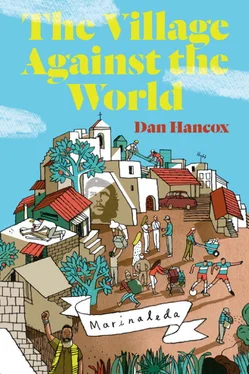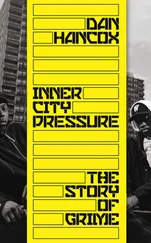‘We went out from the assembly very slowly,’ wrote Sánchez Gordillo in a diary he kept of the hunger strike. ‘Sweat has ravaged us. Some wring out their shirts – this is the sauna of the poor.’
The participation of the children of the village seems especially striking – they could see how desperate their parents’ struggles for survival had become, and the total absence of work, and feel its effects on their households (and dinner plates). Going to bed hungry was a common occurrence. As one newspaper cartoon put it at the time: ‘700 on hunger strike in Marinaleda; the rest, just hungry.’
On day six of the strike, some of the children sat down and together wrote a letter to Prince Felipe, son of King Juan Carlos, heir to the throne, and, at the time, twelve years old. It was published in several Spanish newspapers. As far as the official record is concerned there was little adult involvement in the letter, and either way, it is a remarkable piece of propaganda:
The children of Marinaleda have the pleasure to tell you about the situation in Andalusia and specifically, Marinaleda. A few days ago, our parents, in an open assembly, agreed to go on hunger strike. We are in solidarity with them. We have been on hunger strike for several days.
Why are we on hunger strike? We are on hunger strike because our parents have already spent six months living on the alms of community employment. In our village people earn not even two hundred pesetas a day, because sometimes they only work two days a month. We live in such poverty that some families have to borrow money from their neighbours, because the shops no longer give them credit. Put yourself in our place and think: is it fair that while some children are on holiday with their parents and families, others don’t know if they will eat that night? Is it fair that while some children have private tutors, others can’t even attend state schools? Is it fair that while some waste large amounts of money on toys and luxuries, others have no shoes to wear and must go barefoot?
We don’t think it is, and that is why we are on hunger strike. That is why we have gone several days without food, and we won’t stop until a solution arrives, because this situation is unbearable. It is even more unbearable in a land as rich as Andalusia.
Friend: the problem in our land is serious, and so we are going to continue fighting alongside our parents. We will continue fighting because the problem is also ours; so please consider and answer these questions. What will become of us? Where is our future? Your future, we imagine, is already resolved, but what of ours? Who will resolve ours?
This is not a fairy tale, but a real situation which you will never know … We ask you with all our hearts to stop and think, and perhaps you’ll feel anger or pity and you or your parents will give us some solution.
Sorry if these words are strong, but our hunger is stronger. Greetings from your friends. Marinaleda.
At the heart of this effort of undeniable collective energy, Mayor Sánchez Gordillo, still only thirty-one years old, was transforming into the person he would remain for decades. Notwithstanding his disapproval of leaders, he was more than a simple conduit for people power. Through his ineffable charisma he was leading the pueblo , as much as it was leading him. The people gathered for the general assembly were ‘almost religious in their silence’ when listening to Sánchez Gordillo, observed one visiting journalist – the only interruptions were outbursts of spontaneous applause. The assemblies closed with rousing shouts of ‘ ¡Viva Andalucía! ’ before Sánchez Gordillo implored everyone to go home and rest.
As the strike progressed, there were sympathy hunger strikes in neighbouring pueblos such as Osuna, Martín de la Jara, Aguadulce, Gilena and Los Corrales, as well as a general strike in Cabezas de San Juan. In Herrera, seven miles down the road, 200 workers locked themselves in the Chamber of Agriculture. As the days wore on, even more pueblos across Andalusia held assemblies to consider actions, occupations and demonstrations. The more desperate the situation got, the more its effects spiralled outwards – a truly successful expression of the anarchist tenet of ‘propaganda of the deed’. Spain’s minister of the interior returned from holiday; meetings were held, flimsy promises made, and still Marinaleda voted to continue the hunger strike.
The political tension rose with the medical danger to its participants. By the final full day of the strike, 22 August, people were regularly fainting, and suffering hypoglycemia and crises of hypotension, while one man in his thirties was transferred to hospital in Seville.
At last, Labour Minister Salvador Sánchez Terán and Seville’s civil governor, Isidro Pérez-Beneyto, effectively the leader of the region, returned from their holidays to address the crisis and, after numerous meetings, authorised a payment totalling 253 million pesetas for the Andalusian unemployed ‘to last until the December olive harvest’, as Marinaleda had demanded. While meeting the village’s request, the politicians complained to the press that the whole thing had been exaggerated and cynically orchestrated for the benefit of the SOC union. They also claimed, somewhat implausibly, that the strike had had no effect on their decision to issue the emergency payment.
While the people of Marinaleda recovered, the unrest sparked by the hunger strike continued, with more hunger strikes elsewhere, pueblo -specific general strikes and occupations of government buildings – and solidarity demonstrations as far away as the Basque Country. Without the 253-million-peseta subsidy, it seems the hunger strike of 700 people in one small village could have spiralled into a full-blown regional uprising.
It was a Monday night in Palo Palo, back in December 2012, with León’s country rock CDs playing softly in the background, harmonicas and long verses of longing delivered in Spanish. Monday nights are always very quiet in Andalusia – everyone has spent most of Sunday eating, drinking and socialising, and many restaurants and bars don’t even open. There was a grand total of four of us in the bar: a businessman from Seville, delaying his journey home after visiting a friend, the landlord León, one other middle-aged local guy who often loiters around Palo, who called himself Michael, and me.
There was a Seville—Valladolid football game on TV, but it was going nowhere in particular, and the music was drowning out the commentary, so I got out my Marinaleda – Huelga de Hambre Contra el Hambre pamphlet, the more obscure of the two books written in 1980 that dealt with the hunger strike. After a while, Michael, equally bored by the game, noticed I was reading something in Spanish and asked if he could see it. With his leather jacket, slightly sad, gormless expression, and punky rat-tail haircut, he looked like the kind of guy who had arrived at middle age suddenly, due to a clerical error, and the surprise had devastated him. ‘I’ve not seen this one before,’ he muttered, turning it over in his hands. ‘Man, that was a crazy year … We always have struggles here in Andalusia, but not usually like that. You know we were famous across the world? What a crazy summer.’
He flipped the pages slowly, spotting some familiar faces in the few photos at the back. He kept flicking through, and then his small sharp eyes zeroed in on one particular passage. He smiled, the only time I’ve ever seen him do so. ‘I knew it!’ He beckoned me to lean in. ‘That’s me! That interview is with me, Cornelio! That’s my real name. I was only eleven.’ He called León over from the bar. ‘León, look – it’s me!’
We read it together: he had been a strident young lad, resolute about joining the hunger strike and determined that the young people would remain as steadfast as their parents. ‘Isn’t this a lot to endure for an eleven-year-old?’ the interviewer had asked him. ‘We will endure it,’ he replied. ‘You haven’t eaten anything?’ ‘Just water. We’re going to carry on until they give us work. Or we’ll have to emigrate.’ Even at eleven he was ready to work, he told the incredulous interviewer – picking cotton, in a factory, anything.
Читать дальше












